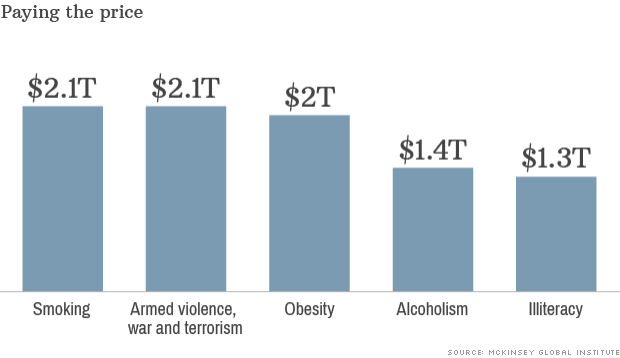Obesity Costs World $2 Trillion; As Much As Smoking, War, And Terrorism

Obesity has now reached financially threatening levels as high as smoking, war, and terrorism. A report from the McKinsey Global Institute reveals the global cost of obesity has risen to a dangerous $2 trillion, and the report's authors believe the problem is completely preventable.
"Obesity isn't just a health issue," one of the report's authors, Richard Dobbs, said in a podcast. "But it's a major economic and business challenge." The authors believe that there is no single or simple solution to the problem, but the indecision on how we should collectively handle the problem hurts any individual country’s efforts.

There are more than 78.6 million obese adults in the United States, and more than 2.1 billion are overweight and obese throughout the world. Currently, 30 percent of the world is overweight or obese. Based on current trends, the Institute predicts that threat will jump to half by 2030. The estimated annual cost of obesity in the United States alone was $147 billion in 2008, and those numbers have risen considerably since then, according to the Centers for Disease Control and Prevention (CDC). When the CDC report came out six years ago, the authors said if obesity continues the way it is we will all feel the financial pressure — both public and private payers.
The annual medical spending per obese person is $1,429 higher than a person with a normal body mass index (BMI). If the cost of each person rises 42 percent higher by 2030, the world will feel a financial pressure like never before. “The connection between rising rates of obesity and rising medical spending is undeniable,” the CDC report wrote.
Children are not exempt from the worldwide obesity epidemic. It took one generation for the rate of childhood obesity to triple, and it is only predicted to increase. Those children are bound to grow, and according to the CDC, it is extremely likely they will become obese adults. Shouldn’t the solution be in the children in order to prevent the future problem?
Even as countries become richer, the economy is losing a substantial amount of money. The cost derives mainly from a combination of production loss due to disability, premature death, and higher health care costs. Government subsidies may be able to eliminate some of these expenditures, but a drastic change is in demand. We need to change the way we grow, harvest, process, and even think about food.

A Global Solution To Obesity
McKinsey’s authors wrote a four step “obesity-abatement program” to dig ourselves out of this unhealthy hole. First, a variety of interventions should be tried out on a large scale in different socioeconomic levels of every society. Then, there needs to be thorough evaluation of how each worked. Incentives and cooperation will be critical to the success of the first step. It’s also advised that no one intervention method should be prioritized because it can distract from the goal of implementing a process on a large scale. Finally, research should continue to prevail in each and every step as society works through trial and error experiments.
We need to learn to exercise because we love our bodies and want to live longer, not because we hate how we look. We need to generate a return on our investment, instead of paying into an endless abyss of piling up medical bills from all comorbid diseases associated with obesity. Diet and physical activity are the investment, and our return is a long, healthy life.



























